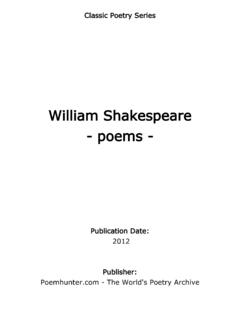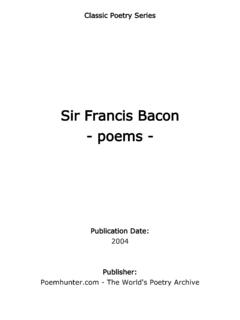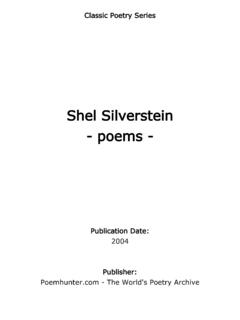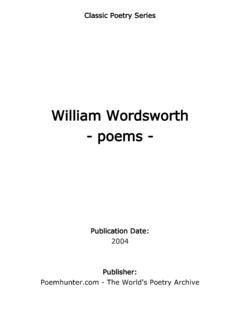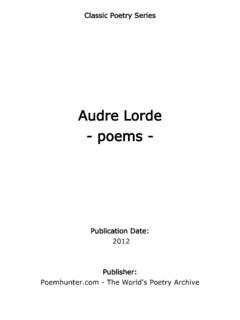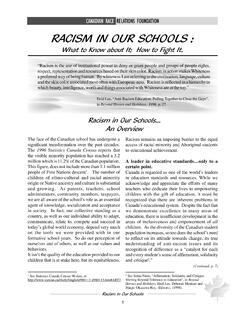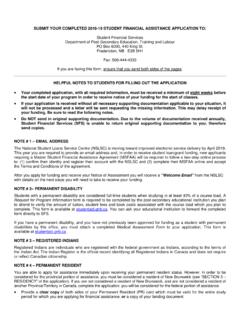Transcription of Langston Hughes - poems - Poem Hunter
1 Classic Poetry Series Langston Hughes - poems - Publication Date: 2012 - The World's Poetry ArchiveLangston Hughes (1 February 1902 22 May 1967) Hughes was an American poet, social activist, novelist, playwright, andcolumnist. He was one of the earliest innovators of the then-new literary art formjazz poetry. Hughes is best known for his work during the Harlem famously wrote about the period that "Harlem was in vogue." Biography ancestry and Childhood Both of Hughes ' paternal and maternal great-grandmothers were African-American, his maternal great-grandfather was white and of Scottish descent. Apaternal great-grandfather was of European Jewish descent. Hughes 's maternalgrandmother Mary Patterson was of African-American, french , English and NativeAmerican descent.
2 One of the first women to attend Oberlin College, she firstmarried Lewis Sheridan Leary, also of mixed race. Lewis Sheridan Learysubsequently joined John Brown's Raid on Harper's Ferry in 1859 and died fromhis wounds. In 1869 the widow Mary Patterson Leary married again, into the elite, politicallyactive Langston family. Her second husband was Charles Henry Langston , ofAfrican American, Native American, and Euro-American ancestry . He and hisyounger brother John Mercer Langston worked for the abolitionist cause andhelped lead the Ohio Anti-Slavery Society in 1858. Charles Langston later movedto Kansas, where he was active as an educator and activist for voting and rightsfor African Americans. Charles and Mary's daughter Caroline was the mother ofLangston Hughes .
3 Langston Hughes was born in Joplin, Missouri, the second child of school teacherCarrie (Caroline) Mercer Langston and James Nathaniel Hughes (1871 1934). Langston Hughes grew up in a series of Midwestern small towns. Hughes 's father left his family and later divorced Carrie, going to Cuba, and thenMexico, seeking to escape the enduring racism in the United States. After theseparation of his parents, while his mother travelled seeking employment, youngLangston Hughes was raised mainly by his maternal grandmother, MaryPatterson Langston , in Lawrence, Kansas. Through the black American oraltradition and drawing from the activist experiences of her generation, MaryLangston instilled in the young Langston Hughes a lasting sense of racial spent most of his childhood in Lawrence, Kansas.
4 After the death of - The World's Poetry Archivegrandmother, he went to live with family friends, James and Mary Reed, for twoyears. Because of the unstable early life, his childhood was not an entirely happyone, but it strongly influenced the poet he would become. Later, Hughes livedagain with his mother Carrie in Lincoln, Illinois. She had remarried when he wasstill an adolescent, and eventually they lived in Cleveland, Ohio, where heattended high school. The Hughes ' home in Cleveland was sold in foreclosure in1918; the , wood-frame house on the city's east side was sold at asheriff's auction in February for $16,667. While in grammar school in Lincoln, Hughes was elected class poet. Hughesstated that in retrospect he thought it was because of the stereotype that AfricanAmericans have rhythm.
5 "I was a victim of a stereotype. There were only two ofus Negro kids in the whole class and our English teacher was always stressingthe importance of rhythm in poetry. Well, everyone knows, except us, that allNegroes have rhythm, so they elected me as class poet." During high school inCleveland, Ohio, he wrote for the school newspaper, edited the yearbook, andbegan to write his first short stories, poetry, and dramatic plays. His first piece ofjazz poetry, "When Sue Wears Red", was written while he was in high school. Itwas during this time that he discovered his love of books. Relationship with Father Hughes had a very poor relationship with his father. He lived with his father inMexico for a brief period in 1919. Upon graduating from high school in June1920, Hughes returned to Mexico to live with his father, hoping to convince himto support Langston 's plan to attend Columbia University.
6 Hughes later said that,prior to arriving in Mexico: "I had been thinking about my father and his strangedislike of his own people. I didn't understand it, because I was a Negro, and Iliked Negroes very much." Initially, his father had hoped for Hughes to attend auniversity abroad, and to study for a career in engineering. On these grounds, hewas willing to provide financial assistance to his son but did not support hisdesire to be a writer. Eventually, Hughes and his father came to a compromise: Hughes would study engineering, so long as he could attend Columbia. His tuitionprovided; Hughes left his father after more than a year. While at Columbia in1921, Hughes managed to maintain a B+ grade average. He left in 1922 becauseof racial prejudice, and his interests revolved more around the neighbourhood ofHarlem than his studies, though he continued writing poetry.
7 Adulthood Hughes worked various odd jobs, before serving a brief tenure as a crewmanaboard the Malone in 1923, spending six months traveling to West - The World's Poetry Archiveand Europe. In Europe, Hughes left the Malone for a temporary stay in Paris. During his time in England in the early 1920s, Hughes became part of the blackexpatriate community. In November 1924, Hughes returned to the U. S. to livewith his mother in Washington, Hughes worked at various odd jobs beforegaining a white-collar job in 1925 as a personal assistant to the historian CarterG. Woodson at the Association for the Study of African American Life and the work demands limited his time for writing, Hughes quit the position towork as a busboy at the Wardman Park Hotel.
8 There he encountered the poetVachel Lindsay, with whom he shared some poems . Impressed with the poems ,Lindsay publicized his discovery of a new black poet. By this time, Hughes 'searlier work had been published in magazines and was about to be collected intohis first book of poetry. The following year, Hughes enrolled in Lincoln University, a historically blackuniversity in Chester County, Pennsylvania. He joined the Omega Psi Phifraternity. Thurgood Marshall, who later became an Associate Justice of theSupreme Court of the United States, was an alumnus and classmate of LangstonHughes during his undergraduate studies at Lincoln University. After Hughes earned a degree from Lincoln University in 1929, he returnedto New York. Except for travels to the Soviet Union and parts of the Caribbean, Hughes lived in Harlem as his primary home for the remainder of his life.
9 Duringthe 1930s, Hughes became a resident of Westfield, New Jersey. Some academics and biographers today believe that Hughes was homosexualand included homosexual codes in many of his poems , similar in manner to WaltWhitman. Hughes has cited him as an influence on his poetry. Hughes 's story"Blessed Assurance" deals with a father's anger over his son's effeminacy and"queerness". To retain the respect and support of black churches andorganizations and avoid exacerbating his precarious financial situation, Hughesremained closeted. Arnold Rampersad, the primary biographer of Hughes , determined that Hughesexhibited a preference for other African-American men in his work and , Rampersad denies Hughes 's homosexuality in his concludes that Hughes was probably asexual and passive in hissexual relationships.
10 He did, however show a respect and love for his fellow blackman (and woman). Other scholars argue for Hughes 's homosexuality: his love ofblack men is evidenced in a number of reported unpublished poems to an allegedblack male lover. - The World's Poetry ArchiveDeath On May 22, 1967, Hughes died from complications after abdominal surgery,related to prostate cancer, at the age of 65. His ashes are interred beneath afloor medallion in the middle of the foyer in the Arthur Schomburg Center forResearch in Black Culture in Harlem. It is the entrance to an auditorium namedfor him. The design on the floor covering his ashes is an African cosmogram titledRivers. The title is taken from his poem, "The Negro Speaks of Rivers". Withinthe center of the cosmogram, above his ashes, is the line: "My soul has growndeep like the rivers".
